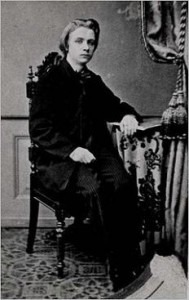 “Minors of the Majors” invites you to discover compositions by the great classical composers that for one reason or another have not reached the musical mainstream. Please enjoy, and keep listening!
“Minors of the Majors” invites you to discover compositions by the great classical composers that for one reason or another have not reached the musical mainstream. Please enjoy, and keep listening!
Throughout his illustrious career as a pianist and composer, Edvard Grieg extensively drew inspiration from the musical sources of his native Norway. He ardently nurtured a passionate faith in the possibility of developing a distinctively Norwegian musical style. Above all, his involvement with folk music had a significant effect on his harmonic imagination and fostered radical advances of his harmonic language. These advances are most prominently highlighted in three sets of piano arrangements, starting with the 25 Norwegian Folk Songs and Dances, published in 1869.
Edvard Grieg: 25 Norwegian Folk Songs and Dances, Op. 17 (Excerpts)
However, Grieg’s encounter with Norwegian folk music soon led to the assumption that he was merely a simple arranger. These accusations deeply wounded the composer and he wrote, “In my Op. 17 and 66, I have arranged folk-songs for the piano, in Op. 30 I have freely rendered folk ballads for the male voice. In three or four of my remaining works, I have attempted to use Norwegian songs thematically. As such, I should be allowed to say that nothing is more incorrect than the claim from certain German critics that my so-called originality is limited to my borrowing from folk music. It is quite another thing if a nationalistic spirit, which has been expressed through folk music since ancient times, hovers over my original creative works.” In his Opus 17, Grieg does take over the folk tune melodies practically note by note. However, what makes this a fascinating collection, nevertheless, is the harmonic foundation supplied by the composer. Grieg writes, “The realm of harmony was always my dream world. I probably have put on paper some horrible chord combinations. To defend myself, however, I will say that they have not arisen from the piano but in my head.” In essence, Grieg is turning these folk songs into character pieces that capture the essence of his nationalist imagination.
You May Also Like
- Minors of the Majors
Johannes Brahms: Deutsche Volkslieder When Johannes Brahms published his folk song adaptations in seven booklets in 1894 he said, “It is the first time that I regard with tenderness that, which I have produced.” - Minors of the Majors
Manuel de Falla: Allegro de Concierto Manuel de Falla’s small oeuvre includes symphonic, instrumental, vocal and theatrical music. - Minors of the Majors
Richard Strauss: Macbeth, Op. 23 Richard Strauss’s monumental tone poems are the central musical expressions of the Austro-German tradition at the turn of the century. - Minors of the Majors
Gustav Holst: Ave Maria Primarily known for his vastly influential orchestral compositions, Gustav Holst (1874-1934) nevertheless composed a wide variety of moving choral works.
More Anecdotes
- Bach Babies in Music
Regina Susanna Bach (1742-1809) Learn about Bach's youngest surviving child - Bach Babies in Music
Johanna Carolina Bach (1737-81) Discover how family and crisis intersected in Bach's world - Bach Babies in Music
Johann Christian Bach (1735-1782) From Soho to the royal court: Johann Christian Bach's London success story - A Tour of Boston, 1924
Vernon Duke’s Homage to Boston Listen to pianist Scott Dunn bring this musical postcard to life
